Unit 7 Will people have robots-第一课时 Section A (1a-2d)课件+嵌入音频(共30张PPT)
文档属性
| 名称 | Unit 7 Will people have robots-第一课时 Section A (1a-2d)课件+嵌入音频(共30张PPT) | 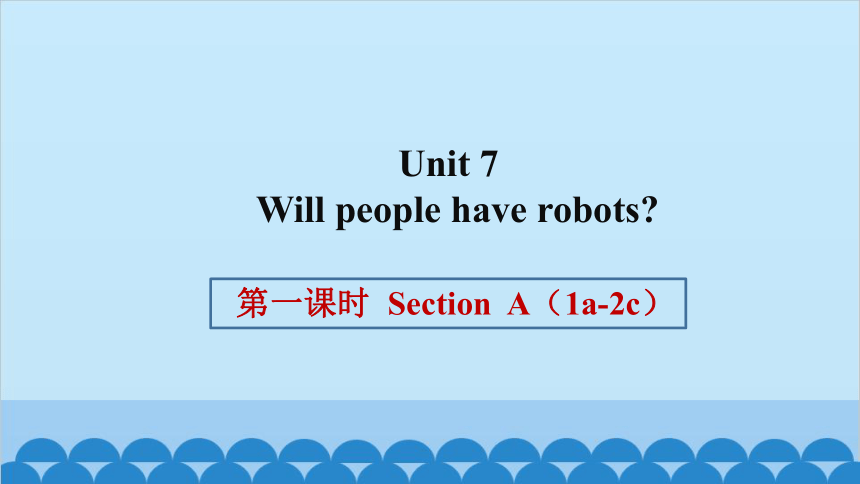 | |
| 格式 | pptx | ||
| 文件大小 | 6.1MB | ||
| 资源类型 | 教案 | ||
| 版本资源 | 人教新目标(Go for it)版 | ||
| 科目 | 英语 | ||
| 更新时间 | 2023-08-25 09:46:23 | ||
图片预览

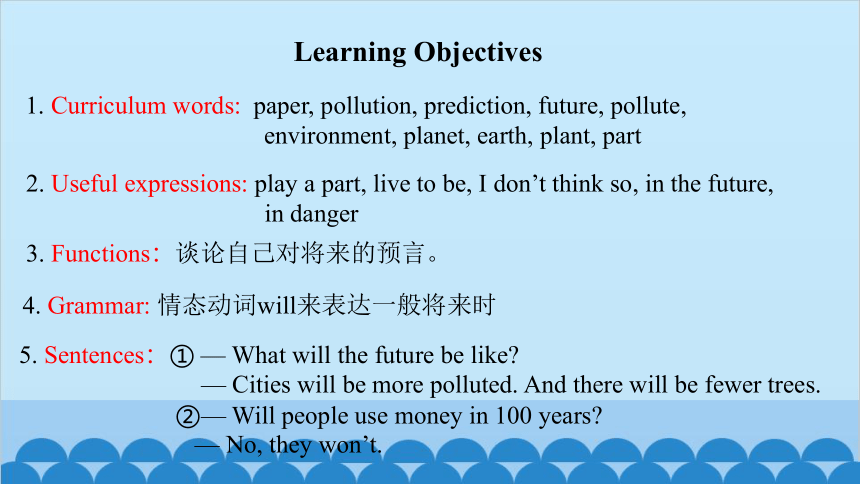
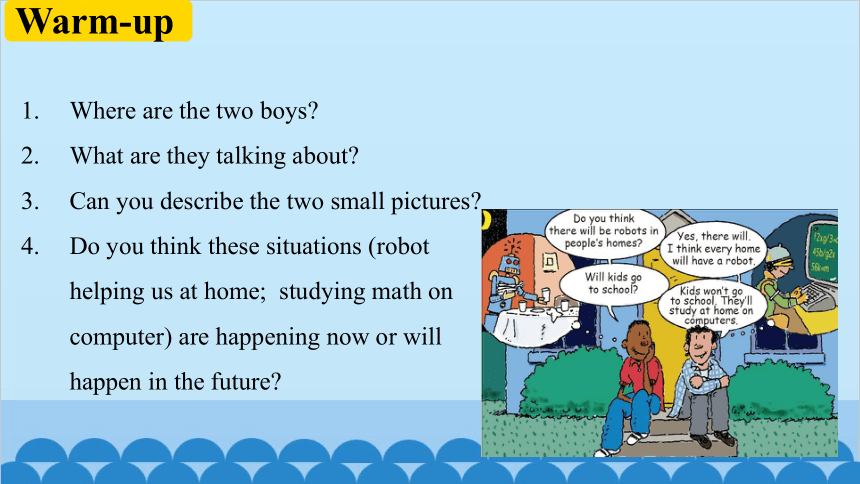
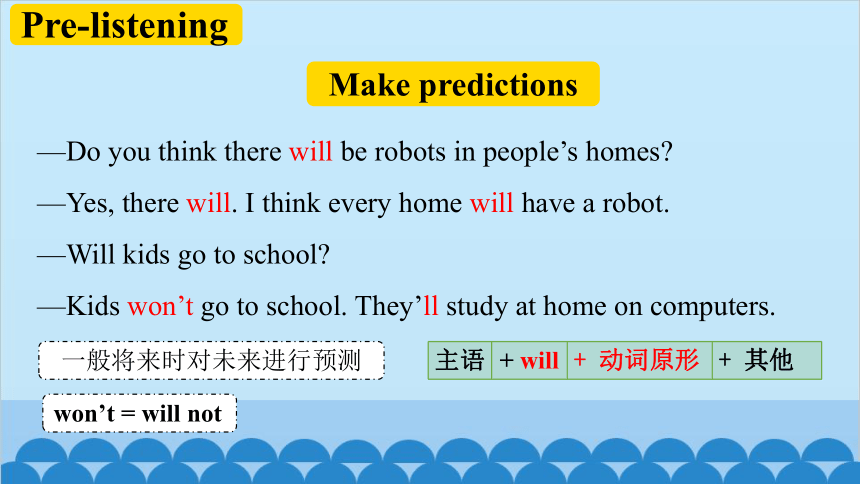
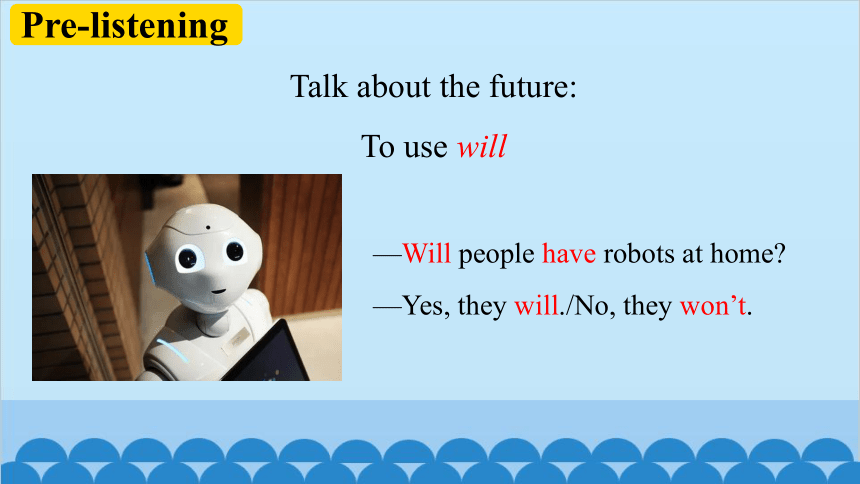
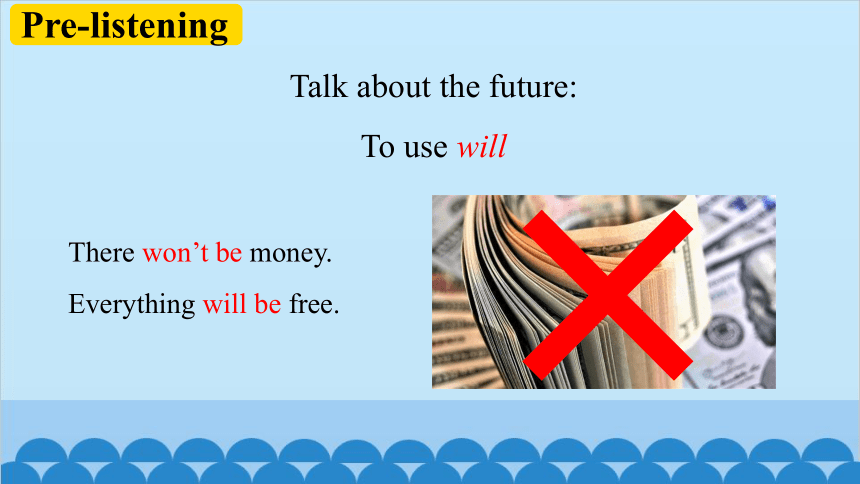
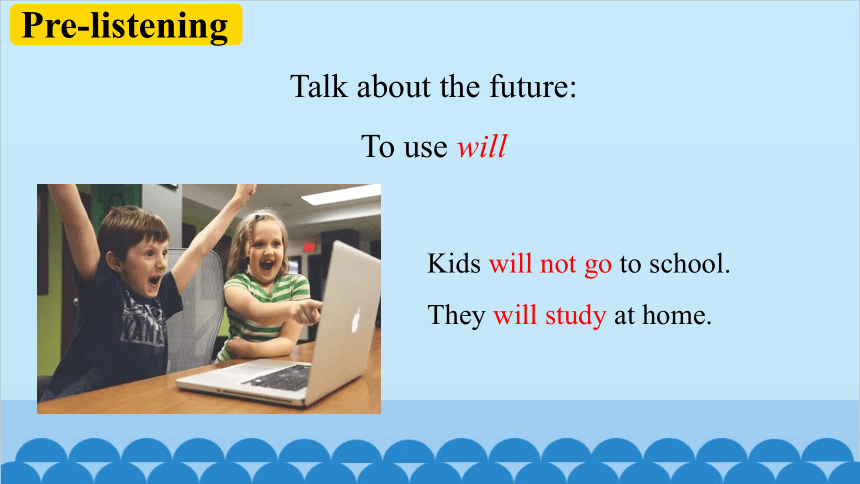
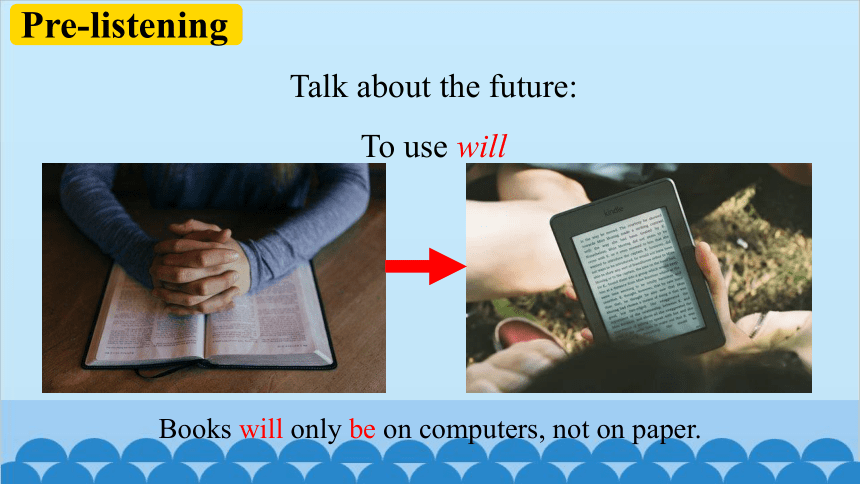
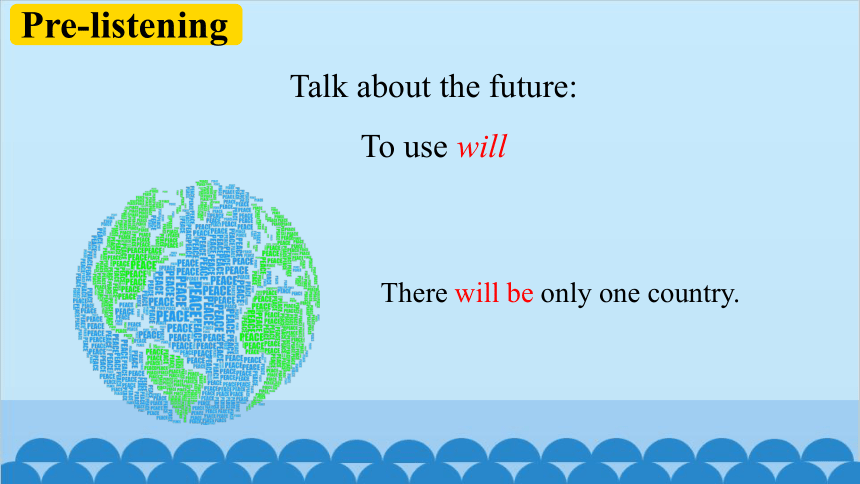
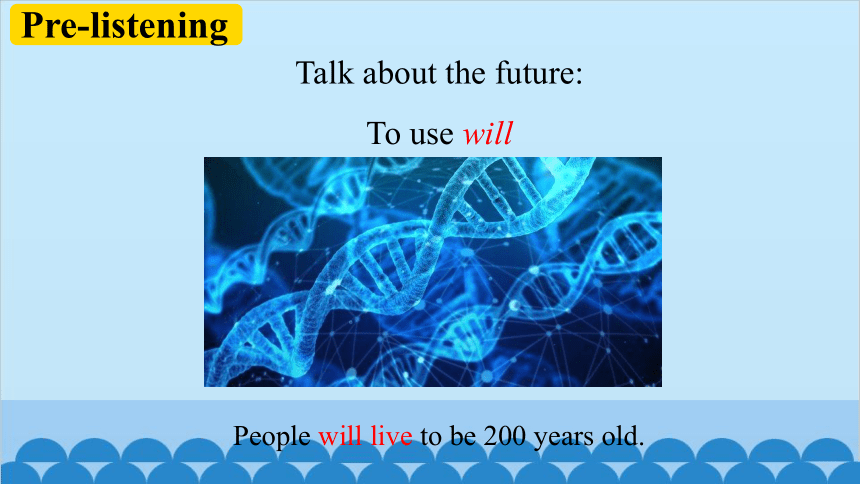
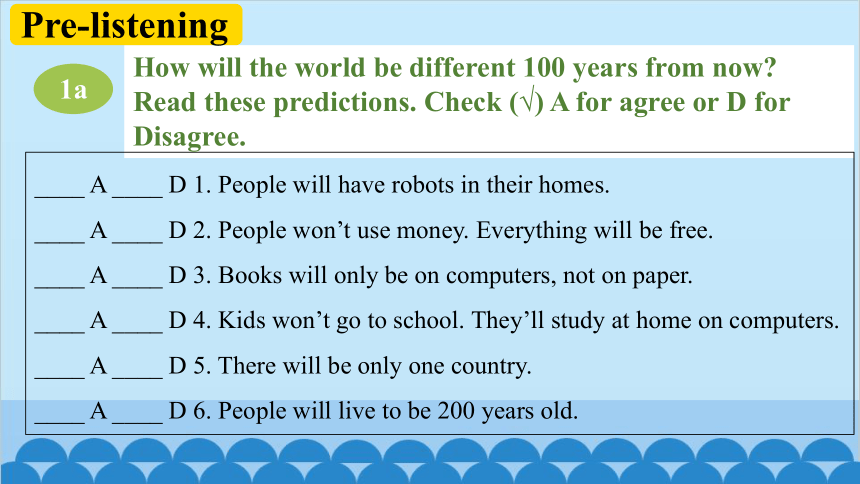
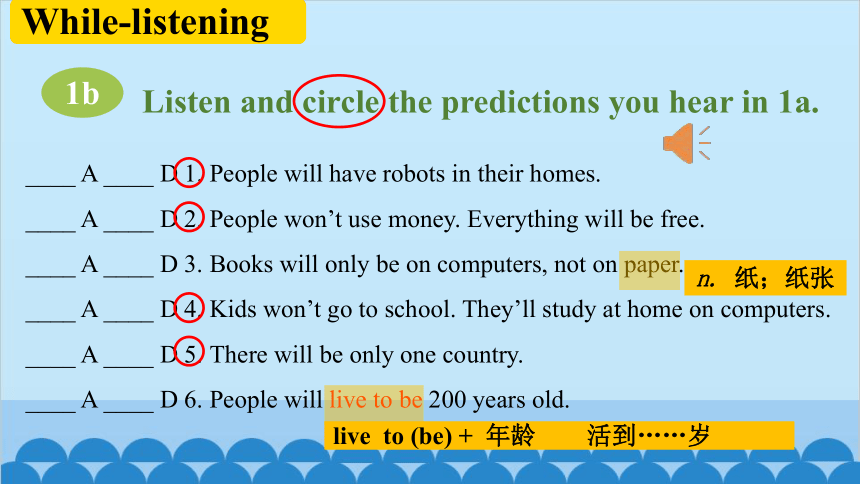
文档简介
(共30张PPT)
Unit 7
Will people have robots
第一课时 Section A(1a-2c)
Learning Objectives
1. Curriculum words: paper, pollution, prediction, future, pollute,
environment, planet, earth, plant, part
5. Sentences:① — What will the future be like
— Cities will be more polluted. And there will be fewer trees.
②— Will people use money in 100 years
— No, they won’t.
2. Useful expressions: play a part, live to be, I don’t think so, in the future,
in danger
3. Functions:谈论自己对将来的预言。
4. Grammar: 情态动词will来表达一般将来时
Where are the two boys
What are they talking about
Can you describe the two small pictures
Do you think these situations (robot helping us at home; studying math on computer) are happening now or will happen in the future
Warm-up
Make predictions
—Do you think there will be robots in people’s homes
—Yes, there will. I think every home will have a robot.
—Will kids go to school
—Kids won’t go to school. They’ll study at home on computers.
won’t = will not
一般将来时对未来进行预测
主语 + will + 动词原形 + 其他
Pre-listening
—Will people have robots at home
—Yes, they will./No, they won’t.
Talk about the future:
To use will
Pre-listening
There won’t be money.
Everything will be free.
×
Talk about the future:
To use will
Pre-listening
Kids will not go to school.
They will study at home.
Talk about the future:
To use will
Pre-listening
Books will only be on computers, not on paper.
Talk about the future:
To use will
Pre-listening
There will be only one country.
Talk about the future:
To use will
Pre-listening
People will live to be 200 years old.
Talk about the future:
To use will
Pre-listening
How will the world be different 100 years from now Read these predictions. Check (√) A for agree or D for Disagree.
1a
____ A ____ D 1. People will have robots in their homes.
____ A ____ D 2. People won’t use money. Everything will be free.
____ A ____ D 3. Books will only be on computers, not on paper.
____ A ____ D 4. Kids won’t go to school. They’ll study at home on computers.
____ A ____ D 5. There will be only one country.
____ A ____ D 6. People will live to be 200 years old.
Pre-listening
Listen and circle the predictions you hear in 1a.
1b
____ A ____ D 1. People will have robots in their homes.
____ A ____ D 2. People won’t use money. Everything will be free.
____ A ____ D 3. Books will only be on computers, not on paper.
____ A ____ D 4. Kids won’t go to school. They’ll study at home on computers.
____ A ____ D 5. There will be only one country.
____ A ____ D 6. People will live to be 200 years old.
n. 纸;纸张
live to (be) + 年龄 活到……岁
While-listening
1c
Ask and answer questions about the predictions in 1a.
A: Will people use money in 100 years
B: No, they won’t. Everything will be free.
Will people live to be 200 years old
A: Yes, they will/ I hope so.
Post-listening
There are five people( one teacher, two boy students, and two girl students) in the picture.
There is a city and probably some planets and two spaceships in the thought bubble.
There are some pictures of robots and a spaceship on the classroom wall.
What can you see in the picture
Pre-listening
2a
Listen and circle the words you hear.
1. There will be (more / less / fewer) people.
2. There will be (more / less / fewer) free time.
3. There will be (more / less / fewer) cars.
4. There will be (more / less / fewer) pollution.
5. There will be (more / less / fewer) trees.
n. 污染;污染物
While-listening
2b
Listen again. Check (√) the predictions you hear.
_____ 1. There will be fewer people.
_____ 2. There will be less free time.
_____ 3. People will use the subways less.
_____ 4. There will be more pollution.
_____ 5. Cities will be very big and crowded.
√
√
While-listening
1. There will be more people.
2. There will be less free time.
3. There will be fewer cars.
4. There will be less pollution.
5. There will be fewer trees.
there be 结构在一般将来时中的运用
There will be + more/less/fewer+名词
more+可数名词或不可数名词
less+不可数名词
fewer+可数名词
都表示同类事物的比较
Post-listening
2c
Make conversations about the predictions in 2a and 2b.
A: What’s your prediction about the future
B: I think there will be more pollution.
A: Really I don’t think so. But I think there will be
fewer trees.
n. 预测;预言
n. 将来;未来
我不这样认为。(表示不赞同)
While-listening
pollute v. 污染
polluted adj.受污染的
environment n.环境
plant v. 种植;n. 植物
pay a part 参与;发挥作用
earth n.地球;世界
Pre-listening
1. What will the future be like according the book about the future
2. What can people do to save the earth
While-listening
Listen and answer:
1. What will the future be like according the book about the future
2. What can people do to save the earth
Cities will be more crowded and polluted. There will be fewer trees and the environment will be in great danger. Maybe people will have to move to other planets.
We can use less water and plant more tress. We should play a part in saving the earth.
Post-listening
1. Books will only be on computers, not on paper.
papern. 纸;纸张, 作不可数名词。表示“一张纸”要用 a piece/sheet of paper, 多于一张纸要用“基数词+pieces/sheets of paper”表示。
With a few cuts, she changes a piece of paper into a beautiful work of art.
There are two pieces of paper on the desk.
拓展延伸:paper作可数名词,意为“报纸;论文;试卷”等。
Lanaguage points
Post-listening
2. Will people use money in 100 years
“in + 时间段”意为“在……之后”,通常用于一般将来时,对其提问要用how soon(多久):
— How soon will he come back — In 20 minutes.
in 表示以现在为起点的将来一段时间之后,后接时间段,通常用于一般将来时。
after 表示从过去某个时间点算起的一段时间之后,后接时间段,通常用于过去时;后接时间点时也可用于一般将来时。
He will come here in two hours.
After about three months, he gave up smoking.
He will arrive after four o’clock.
Post-listening
Lanaguage points
3. Everyone should play a part in saving the earth.
play a part意为“参与;发挥作用”,常与介词in连用,后接名词、代词或动词-ing形式。part在此处作名词,意为“参加;参与”。
Why not play a part in their discussion
Everyone can play an important part in protecting the environment.
Post-listening
Lanaguage points
3. Everyone should play a part in saving the earth.
earth意为“地球;世界”, 表示世界上独一无二的事物,其前一般要加定冠词the。
The earth goes around the sun. 地球绕着太阳转。
on earth 在世界上,在人世间 用作地点状语, 此时与on the earth同义。
到底,究竟 用于疑问词之后,以加强语气。
on the earth 在地球上 用作地点状语。
易混辨析:
Post-listening
Lanaguage points
一、单项选择
Exercises
—Will there be more bikes in our city
—No, I __________.
A. don’t hope so B. think so C. don’t think so D. I hope so
If everything is _____, we won’t use money in twenty years.
A. expensive B. cheap C. busy D. free
The boy is very young, but he _____ an important part _____ our group.
A. takes; in B. plays; in C. takes; for D. plays; for
C
D
B
1
3
2
二、用much,many,more,less,few或fewer填空
Last year I spent ______ time in playing basketball because I had to practice it every day.
I hope we will have _____homework and _____ free time next year.
Our city will become ______ beautiful. I think there will be ______ tall buildings and ______ pollution in it.
Every day mother always has ________ housework to do.
much
less
more
more
more
less
much
1
3
2
4
Exercises
How ________ sisters do you have
________ people like to live in a polluted place.
I’ll use ________ plastic bags to reduce white pollution.
There’s ________ milk in this bottle than in that one.
5
7
6
8
many
Few
fewer
more/less
Exercises
二、用much,many,more,less,few或fewer填空
三、完成句子
The kids will have a party next week.(改为否定句)
The kids _____ _____ a party next week.
He read an article by Han Han last month.(用next month改写句子)
He_____ _____ an article by Han Han next month.
My cousin will arrive in 2 days.(对画线部分提问)
_____ _____ _____ your cousin ________
How will the future be (改为同义句)
_____ will the future be _____
1
3
2
4
won’t have
will read
How soon will
arrive
What like
Exercises
1. Read and recite the new words and 2d.
2. Make a conversation about what the future will be like in 100 years.
Homework
Unit 7
Will people have robots
第一课时 Section A(1a-2c)
Learning Objectives
1. Curriculum words: paper, pollution, prediction, future, pollute,
environment, planet, earth, plant, part
5. Sentences:① — What will the future be like
— Cities will be more polluted. And there will be fewer trees.
②— Will people use money in 100 years
— No, they won’t.
2. Useful expressions: play a part, live to be, I don’t think so, in the future,
in danger
3. Functions:谈论自己对将来的预言。
4. Grammar: 情态动词will来表达一般将来时
Where are the two boys
What are they talking about
Can you describe the two small pictures
Do you think these situations (robot helping us at home; studying math on computer) are happening now or will happen in the future
Warm-up
Make predictions
—Do you think there will be robots in people’s homes
—Yes, there will. I think every home will have a robot.
—Will kids go to school
—Kids won’t go to school. They’ll study at home on computers.
won’t = will not
一般将来时对未来进行预测
主语 + will + 动词原形 + 其他
Pre-listening
—Will people have robots at home
—Yes, they will./No, they won’t.
Talk about the future:
To use will
Pre-listening
There won’t be money.
Everything will be free.
×
Talk about the future:
To use will
Pre-listening
Kids will not go to school.
They will study at home.
Talk about the future:
To use will
Pre-listening
Books will only be on computers, not on paper.
Talk about the future:
To use will
Pre-listening
There will be only one country.
Talk about the future:
To use will
Pre-listening
People will live to be 200 years old.
Talk about the future:
To use will
Pre-listening
How will the world be different 100 years from now Read these predictions. Check (√) A for agree or D for Disagree.
1a
____ A ____ D 1. People will have robots in their homes.
____ A ____ D 2. People won’t use money. Everything will be free.
____ A ____ D 3. Books will only be on computers, not on paper.
____ A ____ D 4. Kids won’t go to school. They’ll study at home on computers.
____ A ____ D 5. There will be only one country.
____ A ____ D 6. People will live to be 200 years old.
Pre-listening
Listen and circle the predictions you hear in 1a.
1b
____ A ____ D 1. People will have robots in their homes.
____ A ____ D 2. People won’t use money. Everything will be free.
____ A ____ D 3. Books will only be on computers, not on paper.
____ A ____ D 4. Kids won’t go to school. They’ll study at home on computers.
____ A ____ D 5. There will be only one country.
____ A ____ D 6. People will live to be 200 years old.
n. 纸;纸张
live to (be) + 年龄 活到……岁
While-listening
1c
Ask and answer questions about the predictions in 1a.
A: Will people use money in 100 years
B: No, they won’t. Everything will be free.
Will people live to be 200 years old
A: Yes, they will/ I hope so.
Post-listening
There are five people( one teacher, two boy students, and two girl students) in the picture.
There is a city and probably some planets and two spaceships in the thought bubble.
There are some pictures of robots and a spaceship on the classroom wall.
What can you see in the picture
Pre-listening
2a
Listen and circle the words you hear.
1. There will be (more / less / fewer) people.
2. There will be (more / less / fewer) free time.
3. There will be (more / less / fewer) cars.
4. There will be (more / less / fewer) pollution.
5. There will be (more / less / fewer) trees.
n. 污染;污染物
While-listening
2b
Listen again. Check (√) the predictions you hear.
_____ 1. There will be fewer people.
_____ 2. There will be less free time.
_____ 3. People will use the subways less.
_____ 4. There will be more pollution.
_____ 5. Cities will be very big and crowded.
√
√
While-listening
1. There will be more people.
2. There will be less free time.
3. There will be fewer cars.
4. There will be less pollution.
5. There will be fewer trees.
there be 结构在一般将来时中的运用
There will be + more/less/fewer+名词
more+可数名词或不可数名词
less+不可数名词
fewer+可数名词
都表示同类事物的比较
Post-listening
2c
Make conversations about the predictions in 2a and 2b.
A: What’s your prediction about the future
B: I think there will be more pollution.
A: Really I don’t think so. But I think there will be
fewer trees.
n. 预测;预言
n. 将来;未来
我不这样认为。(表示不赞同)
While-listening
pollute v. 污染
polluted adj.受污染的
environment n.环境
plant v. 种植;n. 植物
pay a part 参与;发挥作用
earth n.地球;世界
Pre-listening
1. What will the future be like according the book about the future
2. What can people do to save the earth
While-listening
Listen and answer:
1. What will the future be like according the book about the future
2. What can people do to save the earth
Cities will be more crowded and polluted. There will be fewer trees and the environment will be in great danger. Maybe people will have to move to other planets.
We can use less water and plant more tress. We should play a part in saving the earth.
Post-listening
1. Books will only be on computers, not on paper.
papern. 纸;纸张, 作不可数名词。表示“一张纸”要用 a piece/sheet of paper, 多于一张纸要用“基数词+pieces/sheets of paper”表示。
With a few cuts, she changes a piece of paper into a beautiful work of art.
There are two pieces of paper on the desk.
拓展延伸:paper作可数名词,意为“报纸;论文;试卷”等。
Lanaguage points
Post-listening
2. Will people use money in 100 years
“in + 时间段”意为“在……之后”,通常用于一般将来时,对其提问要用how soon(多久):
— How soon will he come back — In 20 minutes.
in 表示以现在为起点的将来一段时间之后,后接时间段,通常用于一般将来时。
after 表示从过去某个时间点算起的一段时间之后,后接时间段,通常用于过去时;后接时间点时也可用于一般将来时。
He will come here in two hours.
After about three months, he gave up smoking.
He will arrive after four o’clock.
Post-listening
Lanaguage points
3. Everyone should play a part in saving the earth.
play a part意为“参与;发挥作用”,常与介词in连用,后接名词、代词或动词-ing形式。part在此处作名词,意为“参加;参与”。
Why not play a part in their discussion
Everyone can play an important part in protecting the environment.
Post-listening
Lanaguage points
3. Everyone should play a part in saving the earth.
earth意为“地球;世界”, 表示世界上独一无二的事物,其前一般要加定冠词the。
The earth goes around the sun. 地球绕着太阳转。
on earth 在世界上,在人世间 用作地点状语, 此时与on the earth同义。
到底,究竟 用于疑问词之后,以加强语气。
on the earth 在地球上 用作地点状语。
易混辨析:
Post-listening
Lanaguage points
一、单项选择
Exercises
—Will there be more bikes in our city
—No, I __________.
A. don’t hope so B. think so C. don’t think so D. I hope so
If everything is _____, we won’t use money in twenty years.
A. expensive B. cheap C. busy D. free
The boy is very young, but he _____ an important part _____ our group.
A. takes; in B. plays; in C. takes; for D. plays; for
C
D
B
1
3
2
二、用much,many,more,less,few或fewer填空
Last year I spent ______ time in playing basketball because I had to practice it every day.
I hope we will have _____homework and _____ free time next year.
Our city will become ______ beautiful. I think there will be ______ tall buildings and ______ pollution in it.
Every day mother always has ________ housework to do.
much
less
more
more
more
less
much
1
3
2
4
Exercises
How ________ sisters do you have
________ people like to live in a polluted place.
I’ll use ________ plastic bags to reduce white pollution.
There’s ________ milk in this bottle than in that one.
5
7
6
8
many
Few
fewer
more/less
Exercises
二、用much,many,more,less,few或fewer填空
三、完成句子
The kids will have a party next week.(改为否定句)
The kids _____ _____ a party next week.
He read an article by Han Han last month.(用next month改写句子)
He_____ _____ an article by Han Han next month.
My cousin will arrive in 2 days.(对画线部分提问)
_____ _____ _____ your cousin ________
How will the future be (改为同义句)
_____ will the future be _____
1
3
2
4
won’t have
will read
How soon will
arrive
What like
Exercises
1. Read and recite the new words and 2d.
2. Make a conversation about what the future will be like in 100 years.
Homework
同课章节目录
- Unit 1 Where did you go on vacation?
- Section A
- Section B
- Unit 2 How often do you exercise?
- Section A
- Section B
- Unit 3 I'm more outgoing than my sister.
- Section A
- Section B
- Unit 4 What's the best movie theater?
- Section A
- Section B
- Unit 5 Do you want to watch a game show?
- Section A
- Section B
- Unit 6 I'm going to study computer science.
- Section A
- Section B
- Unit 7 Will people have robots?
- Section A
- Section B
- Unit 8 How do you make a banana milk shake?
- Section A
- Section B
- Unit 9 Can you come to my party?
- Section A
- Section B
- Unit 10 If you go to the party, you'll have a grea
- Section A
- Section B
